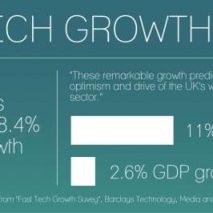The internet is awash with big tech predictions at the moment, with industry-watchers competing to cook-up their future vision for how businesses will be affected by new technology in the coming years.
We thought it would be a good idea to boil down (and mash up) the most worthwhile pieces of futurology out there to bring you a definitive top 4 IT trends that every business should be scanning the horizon for.
AI’s hype is becoming justified
There seems to be unanimous support among analysts for the idea that artificial intelligence (AI) is lined up behind ‘cloud’ and “Internet of Things’ as the next big thing in IT that will actually end up happening.
From driverless cars and Amazon Alexa to Google Translate and the most ambitious reaches of experimental medical technology, the current applications for AI are numerous now that the underlying technology has reached an advanced and stable level.
The implications for businesses are significant, as AI becomes more accessible to harness in a variety of processes and interactions. For example, more intelligent customer-facing chatbots that use AI to learn about individuals and type of individuals in order to become more autonomous and successful, increasing customer satisfaction, retention and other metrics.
The likes of Professor Stephen Hawking anticipate huge social change as a result of up to 50% of the current workforce losing their jobs (over the long term) because of the increased automation possibilities created by AI. Whether this turns out to be the case or not, the profit and efficiency opportunities for businesses will undoubtedly prove compelling.
Software is where the smart money is going
Analysis of spending trends indicate that global IT spending will hit a record level of $3.5 trillion in 2017 – with much of its growth spurred on by the increasing importance of software. As business IT infrastructures continue to virtualise and migrate to the cloud, traditional IT hardware spending is being focused on commodity silicon rather than the expensive, complex proprietary systems of old. The slack is being taken up by larger investments in software, including bespoke software development.
Hardware has, in effect, normalised to a basic set of platform functionalities, while software has cemented its place as the primary opportunity for a business to differentiate itself and extend its value through digital initiatives.
AR could be more than a pretender to VR’s throne
Many of the latest predictions appear to backtrack on earlier claims that virtual reality (VR) will emerge as the predominant vehicle for the human/technology interfaces of the near future. As it turns out, while VR has clear advantages for certain bespoke applications, such as healthcare, many now believe its mass-market appeal will struggle to travel beyond the video gaming industry any time soon.
About to supplant VR in the short-term could be augmented reality (AR), its traditional bridesmaid. The reason for this is the industry’s open-secret that Apple’s next iPhone launch – due in the second half of this year – will major on AR, providing advanced new AR capabilities to a significant proportion of global business IT users. And if that wasn’t enough, look out for Snap Inc. (on course for the biggest tech IPO since Facebook, potentially later this year) building on the successful release of its ‘Spectacles’ AR platform.
Start getting used to hearing about Blockchain
Gartner is perhaps the most influential voice in enterprise IT, at least as far as predicting the future goes. So plenty of organisations sit up and take notice when it says that, by 2022, a Blockchain based will exist worth more than $10 billion.
Blockchain is the distributed ledger technology that underpins virtual currencies like Bitcoin. According to another digital futurologist, Don Tapscott, Blockchain can be programmed to record not just financial transactions but “virtually everything of value and importance to humankind: birth and death certificates, marriage licenses, deeds and titles of ownership, educational degrees, financial accounts, medical procedures, insurance claims, transactions between smart objects, and anything else that can be expressed in code.”
Experts variously predict that Blockchain will revolutionise cybersecurity, data storage, election voting, banking and much more besides. The ramifications for business are enormous, and the development of applications is happening at lightning pace, albeit still at a relatively early stage. Healthcare could, yet again, be among the industry sectors most likely to benefit from a new, breakthrough technology sooner rather than later, thanks to innovators such as Gem.
Regardless of the digital technology at play, the reality of business is that all processes and interactions can be benefited by the intelligent, strategic use of software. For everyone at illumo digital, this is our starting point for exploring which technology trends are best for them, both now and for the future, enabling our clients to take full advantage.

